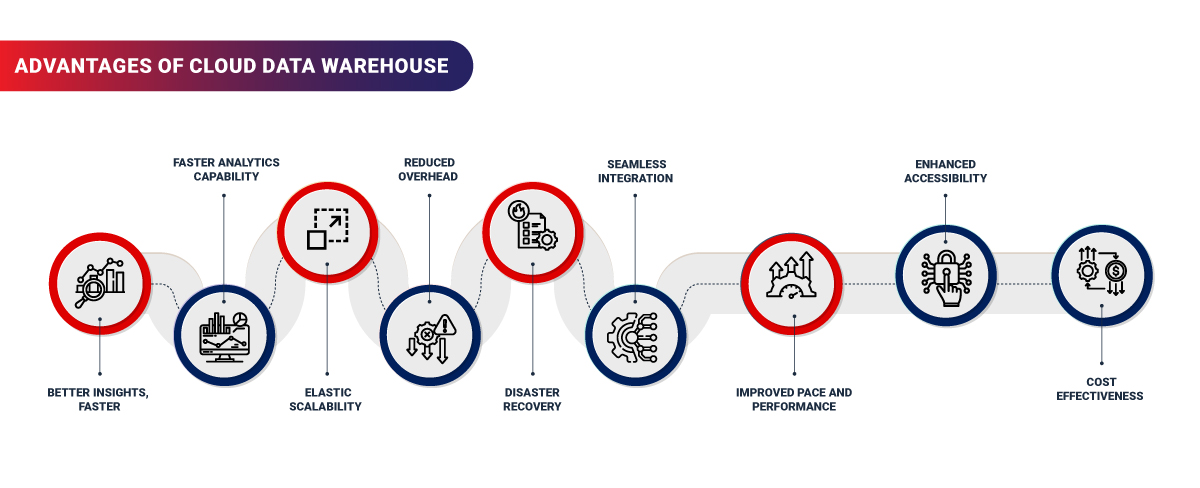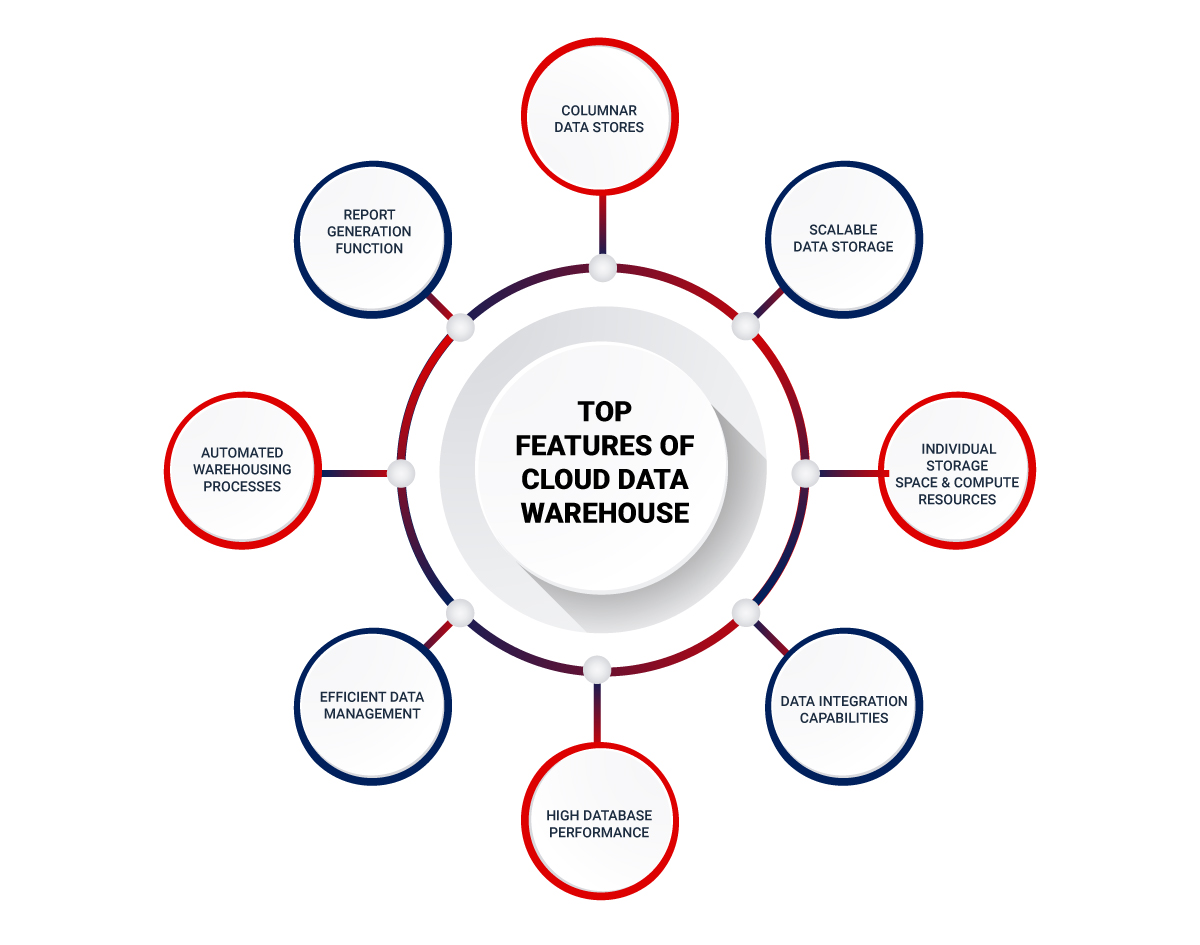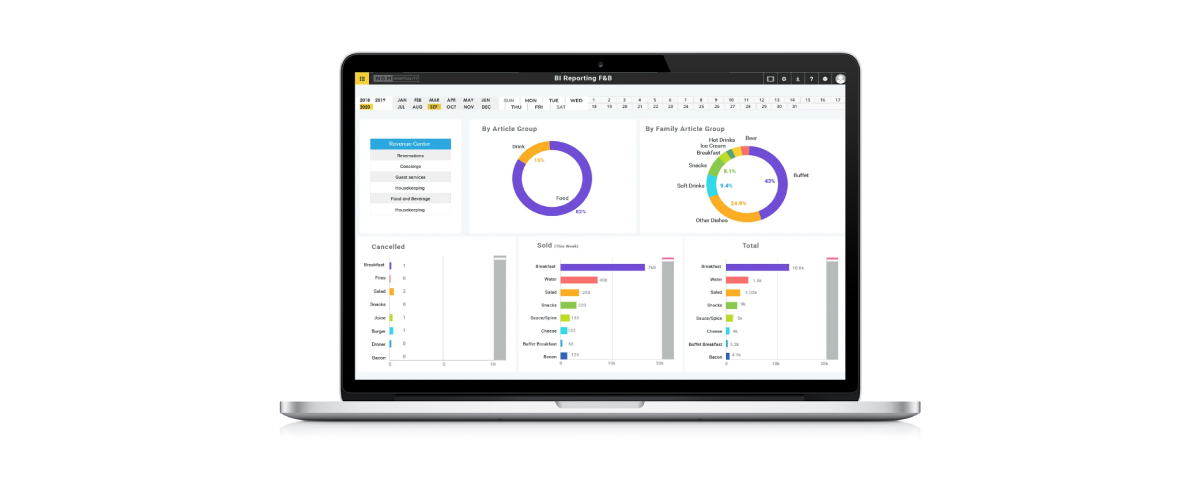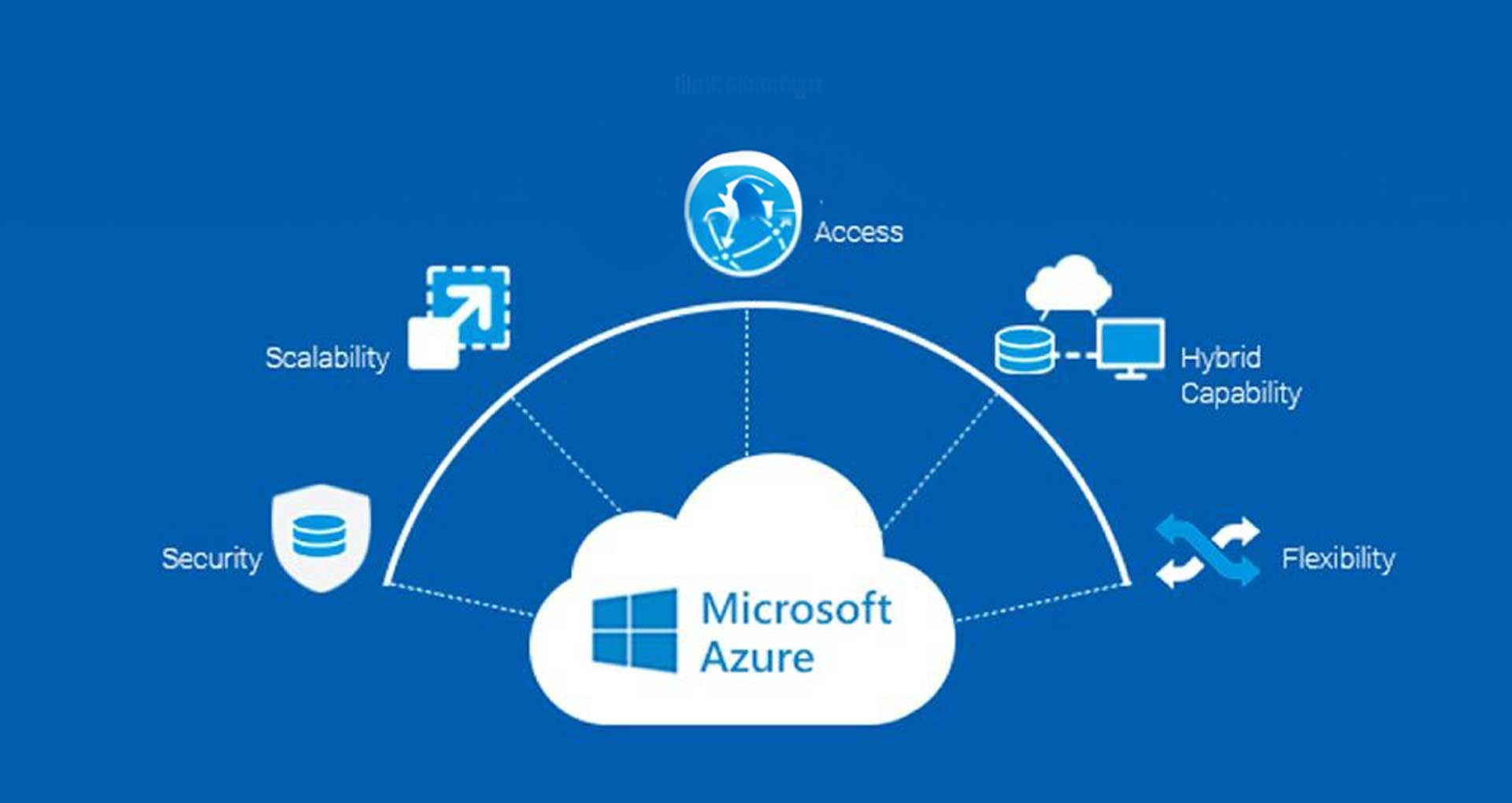The cloud data warehouse market size is expected to grow to $28.61[1] Billion by 2030 at a CAGR of 22.7%. The statistics clearly show why more and more businesses are moving from traditional data warehouses. Cloud-based data warehouse can dynamically scale and shrink to meet your ever-changing user needs & business priorities! It is an excellent solution for enterprises that require the agility to store, process & manage massive amounts of data for analytics & BI applications.
This blogpost focuses on helping you explore the basics of a cloud data warehouse, its key features, business benefits, reasons to move to a cloud data warehouse (DWH), major cloud data warehouse providers & how to choose the right one. So, let’s get started!
What is a Cloud Data Warehouse?
A cloud data warehouse (CDW) is a database stored and managed within a public cloud and optimized for scalable BI and analytics. It leverages the cloud’s scalability, usability and interoperability to allow your organization’s business intelligence teams to extract actionable insights for quick, data-driven decision-making.
Here are certain key capabilities inherent to a cloud data warehouse that make it valuable for businesses.
- Scalability: CDW can easily scale up or down to accommodate changing data volumes and processing needs without compromising performance. It also eliminates the need to invest in expensive hardware and software upgrades.
- Performance: Delivers quick and efficient query execution of large datasets.
- Data Management: Combines data from diverse sources to enable a unified view of the business.
- Automatic Upgrades: Regular automatic updates ensure the latest features and security patches.
- Capacity Management: Allows to dynamically adjust to fluctuating data volumes to meet evolving business needs.
- Accessibility: Enables users access to data from anywhere to foster collaboration among distributed teams.
- Cost-Effectiveness: CDW offers a pay-as-you go pricing model, thus eliminating the need to invest in IT infrastructure host and aligning the expenses with data usage.
- Security: Cloud vendors employ robust encryption and access control mechanisms to protect sensitive information.
- Integration: Data warehousing in the cloud facilitate seamless data ingestion, transformation, and analysis by integrating with various data sources.
Cloud Data Warehouses vs Traditional On-Premise Data Warehouses
Traditional on-premises data warehouses can no longer cope up with the growing data analytics needs, diverse data sources, and demand for elastic scalability. Let’s explore key differences between cloud vs on premise data warehouse.
| Parameter | Cloud DWH | On-Premise DWH |
| Scalability | Can scale up or down to accommodate changing data volumes and business needs. | Costly to scale and complex to scale down. |
| Maintenance | Pay-as-you-go pricing model, you only spend on the storage space and cloud features you need. It is maintained by the cloud provider, which helps reduce IT burden. | Typically need ongoing maintenance for hardware and software, periodic upgrades, and new tools over time. |
| Availability | Leading cloud providers (Amazon, Microsoft, and Google) ensure up to 99.99% of uptime. | Depends on the hardware & software quality and the competence of the in-house IT team. |
| Performance | Can serve multiple geographic locations with excellent query-handling capability that can be measured in seconds. | Offers excellent performance that can be managed in milliseconds if the scalability challenge is solved. |
| Security | Ensured by the cloud provider to protect infrastructure and data safety. | It largely depends on the competence of the in-house IT team. |
| Cost-Effectiveness | Zero hardware-related costs with the possibility to pay as per the pay-as-you-go model.
|
Requires significant initial investments (hardware, IT team, training & more). |
| Agility | Faster to deploy and implement new features. | Slower to deploy and implement. |
| Deployment | Since it is a Software as a Service, quick deployment with on-demand resources, reduced time to value. | Longer lead times for setup, configuration and procuring hardware. |
| Integration | Better equipped to handle integration of diverse, multi-source data. | Usually struggles with integrating diverse data types. |
| Updates | Minimal downtime due to automated updates and managed services. | Prone to downtime due to manual upgrades. |
| Disaster Recovery | Built-in disaster recovery options and data protection features like encryption, IAM help protect data and applications. | Depends on on-premise physical servers and data centers for backups and recovery solutions. |
Benefits of Cloud Data Warehouse
Modern cloud architectures combine the flexibility of the cloud, the agility of big data platforms & the power of data warehousing – at a fraction of the cost of on-premises solutions. Cloud based data warehouses offer several benefits:

Better Insights, Faster:
- With powerful computing capabilities, cloud DWH delivers real-time analytics allowing users to extract actionable insights quickly.
- Real-time access to rich insights helps identify opportunities, hidden patterns, trends, and correlations, enabling a culture of data-driven decision-making.
Faster Analytics Capability:
- Cloud based data warehouses provide quicker real-time analytics compared to on-premises setups.
- Enables swift responses to market changes and identification of opportunities or challenges.
Elastic Scalability:
- Easily scales storage as needed without purchasing additional hardware.
- Allows businesses to expand or reduce data storage and computing capacity based on evolving needs.
Reduced Overhead:
- Eliminates the need for a dedicated server room and costly hardware.
- Minimizes operational costs by avoiding manual upgrades and troubleshooting.
Disaster Recovery:
- Facilitates consistent backups and asynchronous duplication without disrupting work.
- Eliminates the need for a separate disaster recovery data center, ensuring smooth operations during disruptions.
Seamless Integration:
- Compatible with different querying languages, facilitating integration with various data sources.
- Improves the accuracy of business intelligence applications.
Improved Pace and Performance:
- Offers superior processing capabilities to handle expanding data sources (CRM, ERP, social media & support systems) while maintaining processing speed.
- By providing on-demand scalability and high-performance infrastructure, cloud data warehouse allows organizations to perform complex queries to gain insights in real-time.
Enhanced Accessibility:
- Provides secure access to authorized users from anywhere with an internet connection.
- Promotes collaboration across teams and facilitates data-driven decision-making.
Cost-Effectiveness:
- Operates on a pay-as-you-go model, aligning IT expenses with actual data usage.
- Ideal for businesses of all sizes, supporting operational efficiency and gaining a competitive edge.
Now that you’ve explored the multi-fold benefits of cloud data warehousing, let’s explore the key capabilities of cloud data warehouse features.
Cloud Data Warehouse Key Features
There are many cloud-based data warehouse solutions in the market and most have these inherent cloud-based enterprise data warehouse features:

- Columnar Data Stores: The most adaptable for analytics, cloud data warehouses help process data in columns and aggregate queries for faster reporting. This architectural approach enhances query performance, allowing for faster and more efficient data retrieval and analysis. The columnar storage is particularly well-suited for analytical workloads, contributing to improved processing speeds.
- Scalable Data Storage: Features like compression & deduplication enable you to store as much data as you need while saving space and optimizing performance. Businesses can thus seamlessly scale their storage needs up or down based on demand, eliminating the constraints of traditional on-premises solutions.
- Individual Storage Space & Compute Resources: Allows managing massive amounts of data & simultaneously in one location with required flexibility and agility. This personalized approach ensures optimal performance and resource utilization, allowing businesses to allocate resources based on their unique data processing and storage requirements.
- Data Integration Capabilities: Makes it easy to connect disparate data sources with robust tools for creating and managing datasets, setting permissions and running queries. Cloud data warehouses excel in data integration, seamlessly connecting and consolidating data from various sources. This feature enables businesses to create a unified view of their information landscape, fostering comprehensive analyses and insights.
- High Database Performance: CDW’s architecture, combined with advanced optimization techniques, enables rapid query processing and analytics. It is ensured by in-memory caching, parallel query processing and columnar storage.
- Efficient Data Management: Integrate extensive tools to create and manage databases, run queries, and set permissions. It ensures accurate data safety along with automated backups & disaster recovery. The CDW platform also offers robust tools and functionalities for organizing, cleaning, and structuring data together with ensuring that the information stored is accurate, up-to-date, and easily accessible.
- Automated Warehousing Processes: Allows you to create efficient data models for critical processes. It eliminates the need for human intervention for planning, modeling & deploying the steps for extracting insights from operations. From data loading to indexing and optimization, these platforms automate routine tasks, reducing the manual workload on IT teams.
- Report Generation Function: Allows you to identify trends and correlations in your operational processes and makes data accessible for dashboarding, visualization & reporting. The integration of reporting tools facilitates the creation of comprehensive and visually appealing reports and dashboards. This feature empowers businesses to communicate insights effectively, supporting data-driven decision-making across all levels of the organization.
Although cloud data warehouse offers many benefits and features, it also presents challenges that need to be addressed to ensure successful implementation and operation.
Cloud Data Warehouse Challenges and Their Solutions
Here’s an overview of the top cloud data warehousing challenges businesses face today and their solutions to overcome them:
Challenge: Data Governance and Integration
Businesses often struggle to integrate data from disparate sources, ensuring data quality and consistency, and establishing effective data governance practices. This data chaos can hinder data analysis and decision-making.
Solution:
Implement a robust data governance framework that defines data ownership, access controls, and data quality standards. Utilize data integration tools to streamline data ingestion, transformation, and cleansing.
Challenge: Cost Optimization
Cloud data warehousing costs can spiral out of control if not managed effectively. Businesses often lack clear visibility into their cloud data usage and fail to optimize resource allocation.
Solution:
Employ cloud cost management tools to monitor and granularly control cloud data usage. Leverage serverless computing options for workloads that don’t require constant resource provisioning.
Challenge: Skills Shortage
Finding qualified cloud data warehousing professionals is a growing challenge, making it difficult for businesses to build and maintain the expertise needed to manage complex data warehousing environments.
Solution:
Invest in training and upskilling existing IT staff to acquire cloud data warehousing skills. Consider outsourcing cloud data warehousing operations to specialized service providers.
Challenge: Security and Regulatory Compliance
Businesses must adhere to stringent data privacy regulations, such as GDPR and CCPA, while safeguarding their cloud data from unauthorized access and breaches.
Solution:
Implement robust access controls, encryption, and data masking techniques to protect sensitive data. Prioritize cloud providers with strong security credentials and compliance certifications.
Challenge: Data Silos and Lack of Collaboration
Data often remains siloed within departments, hindering cross-functional collaboration and insights that could be gained from a unified view of data.
Solution:
Promote a data-driven culture that encourages data sharing and collaboration across departments. Implement data sharing platforms to facilitate secure data access and collaboration.
Challenge: Data Observability and Monitoring
Businesses need to continuously monitor their cloud data warehousing infrastructure to identify performance bottlenecks, resource utilization patterns, and potential security issues.
Solution:
Employ cloud data warehousing monitoring tools to track key performance indicators, resource utilization, and security metrics. Proactively address issues identified through monitoring to maintain optimal performance and security.
The challenges of cloud data warehousing listed above can be overcome by choosing top cloud data warehouse services like Snowflake, Amazon Redshift, Google BigQuery and others listed below.
Top Cloud Data Warehouse Services
Here are popular cloud data warehouse solutions offered by leading cloud vendors to help you find the best fit for your business needs:
Cloud Data Warehouse: Firebolt
Value Proposition:
- Unmatched performance for real-time insights.
- Elastic scalability for handling growing data volumes.
- Cost-effective data warehousing.
Pros:
- Extreme Performance: Known for exceptional performance, processing large volumes of data with extremely high speed.
- Scalability: Highly scalable, allowing businesses to adapt to growing data volumes without significant upfront hardware investments.
- Cost-Effectiveness: Offers a cost-effective solution compared to traditional on-premises data warehouses.
Cons:
- Limited Integration Options: Integration options with other data sources and business applications can be limited.
- Limited Deployment Options: Can only be deployed on a few cloud providers.
Ideal For:
- Data-intensive organizations requiring real-time analytics.
- Enterprises prioritizing high-performance data analysis.
- Organizations looking for a cost-effective data warehousing solution.
Cloud Data Warehouse: Azure Cosmos DB + Azure Synapse Analytics
Value Proposition:
- Global data reach with low latency and high availability.
- Hybrid HTAP power for real-time transactions and complex data analysis.
- Seamless Azure integration for a unified data management experience.
Pros:
- Global Distribution: Azure Cosmos DB’s global distribution ensures low latency and high availability, making it optimal for geographically dispersed data.
- Hybrid Transactional/Analytical Processing (HTAP): Azure Synapse Analytics facilitates real-time transactions and complex data analysis within a unified environment.
- Integration with Azure Ecosystem: Seamless integration with other Azure services provides a cohesive data management platform.
Cons:
- Pricing Complexity: The pricing structure can be intricate, necessitating careful consideration of usage patterns and resource allocation.
- Limited Third-Party Tools: Availability of third-party tools and integrations may be less extensive compared to some competitors.
Ideal For:
- Enterprises with global data distribution needs.
- Companies seeking hybrid HTAP capabilities.
- Organizations leveraging the Azure ecosystem.
Cloud Data Warehouse: Snowflake
Value Proposition:
- Cloud-native agility for modern data warehousing.
- Multi-cloud freedom to avoid vendor lock-in.
- Accelerated data insights through optimized query performance.
Pros:
- Cloud-Native Architecture: Highly scalable and flexible, enabling businesses to adapt to changing data needs.
- Multi-Cloud Deployment: Offers flexibility and avoids vendor lock-in by allowing deployment across multiple cloud providers.
- Query Acceleration: Optimizes query performance for efficient analysis of large datasets.
- Seamless Integration: Integrates seamlessly with various business applications and data sources.
Cons:
- Pricing: Snowflake is more expensive than its competitors. It is because it offers high performance and the pricing model is based on on-demand consumption.
- Complexity: Architecture may be more complex than some alternatives, requiring additional expertise.
Ideal For:
- Enterprises seeking cloud-native data warehousing.
- Organizations requiring multi-cloud flexibility.
- Businesses prioritizing query performance.
Cloud Data Warehouse: Amazon Redshift
Value Proposition:
- Deep AWS integration for comprehensive data management.
- High performance for efficient analysis of large datasets.
- Cost-effective data warehousing within the AWS ecosystem.
Pros:
- Deep Integration with AWS: Seamless integration with other AWS services provides a comprehensive data management solution.
- High Performance: Efficiently analyzes large datasets with high-performance data warehousing tasks.
- Cost-Effectiveness: Offers a cost-effective solution, especially for businesses already invested in the AWS ecosystem.
- User-Friendly Interface: Intuitive and easy-to-use UI.
Cons:
- Limited Deployment Options: Can only be deployed on Amazon Web Services (AWS).
- Scalability Limitations: May have scalability limits for extremely large data volumes.
Ideal For:
- Businesses already invested in the AWS ecosystem.
- Organizations requiring high-performance data warehousing.
- Companies seeking a cost-effective data warehousing solution.
Cloud Data Warehouse: Google Big Query
Value Proposition:
- Serverless scalability and cost-effectiveness.
- High performance for complex analytics.
- Integrated data analytics ecosystem.
Pros:
- Cost-Effectiveness: Google BigQuery boasts a competitive pricing model, making it a cost-effective choice for large-scale data warehousing.
- Serverless Architecture: Its serverless architecture eliminates the need for infrastructure management, reducing administrative overhead.
- Machine Learning Integration: Built-in machine learning capabilities facilitate data-driven insights and predictive modeling.
Cons:
- Limited Data Governance Features: The data governance features may not be as robust as some competitors, requiring additional effort to implement.
- Data Privacy Concerns: Storing data in Google’s cloud may raise privacy concerns for certain organizations.
Ideal For:
- Data-driven organizations with infrequent queries.
- Businesses seeking cloud-based data analytics solutions.
How to Choose the Right Cloud Data Warehouse Vendor for Your Business
Here are some key factors you need to ensure that your chosen vendor meets your unique business.
- Data Volume and Growth: Evaluate your current and projected data volume, including data ingestion rates and query complexity. Choose a vendor whose solution aligns with your data needs and growth trajectory.
- Performance Requirements: Assess the performance needs of your business, including required query response times and concurrent user support. Opt for a vendor that can deliver the performance necessary to support your data-driven initiatives.
- Scalability: Select a vendor offering a cloud data warehouse that can scale elastically to accommodate future data growth without significant upfront investments. Flexibility in scaling is crucial to adapting to evolving business needs.
- Cost: Compare pricing models, considering factors such as storage, compute, and data transfer costs. Optimize your cloud based data warehouse usage to ensure cost-effectiveness and value for your investment.
- Integration Capabilities: Ensure the vendor’s solution integrates seamlessly with your existing data sources, BI tools, and business applications. Integration is key to leveraging data effectively across your organization.
- Security and Compliance: Evaluate the vendor’s security measures and compliance certifications. Data security and compliance are paramount for maintaining trust and meeting regulatory requirements.
- Vendor Support: Assess the vendor’s customer support options, including training, documentation, and technical assistance. Comprehensive support is essential to address any issues promptly and ensure a smooth operation.
Cloud Data Warehouse Vendor Support for Implementation and Migration
In addition to setting up cloud data warehouse, vendors play a crucial role in assisting businesses with implementation and migration. Here are some ways vendors can help:
- Consultation and Advisory Services: Vendors can provide expert consultation and advice on cloud data warehouse architecture, data modeling, and best practices.
- Migration Tools and Resources: Offering migration tools and resources streamlines the process of moving data from on-premises systems to the cloud data warehouse.
- Hands-on Implementation Support: Vendors can provide hands-on support to help businesses configure and deploy their cloud based data warehouse solutions effectively.
- Training and Certification Programs: Vendors often offer training and certification programs to empower users to effectively utilize the cloud data warehouse and extract valuable insights.
- Ongoing Maintenance and Support: Vendors play a crucial role in providing ongoing maintenance and support to ensure the cloud data warehouse operates smoothly and efficiently.
Importance of Cloud Data Warehouse Automation
Cloud data warehouse automation automates many of the manual, repetitive, and time-consuming tasks which allows organizations to reap the following benefits.
- Faster Data Ingestion and Processing: Cloud data warehouse Automation expedites data ingestion, transformation, and loading (ETL/ELT) processes to reduce data latency. It helps businesses analyze data in real-time, which enables real-time insights for faster data-driven decision making.
- Enhanced Data Quality and Consistency: Automation eliminates human error, ensuring data accuracy, consistency, and reliability. This data integrity is crucial for deriving accurate insights and making informed decisions.
- Reduced Operational Costs: Automation significantly reduces the manual labor required for data management, saving businesses time, resources, and money.
- Scalability: Cloud data warehouse Automation empowers businesses to optimize resource utilization and swiftly adapt to evolving data volumes and dynamic business needs to meet growing demands.
- Increased user Productivity: By automating repetitive processes, such as data ingestion, transformation, and loading (ETL/ELT), cloud data warehouse automation reduces the workload for IT teams and allows them to dedicate their expertise to more value-added activities.
How Rishabh Software Can Help You Get Started with Cloud Data Warehouse?
Being an industry leader in cloud application development, our expertise lies in developing and deploying cloud-native apps and the best cloud data warehouse solutions that fit your specific industry and meet your strategic business goals.
As certified service partners for AWS and Microsoft Azure, we can help companies like yours to navigate the Data Warehouse (DWH) journey to redefine how your organization manages data. Additionally, as your trusted data analytics company, our team of data engineers, designers, developers, architects, and data scientists help you set up a modern data architecture comprising technologies such as cloud, AI, ML, IoT, and advanced analytics. If you are unsure either about your exact storage, processing, and analytics requirements or about the best-fitting cloud data warehouse platform, we can help.
Our dedicated data warehouse development services cover cloud DWH consulting, designing, quality assurance & implementation with migration & modernization assistance.
Success Story: Cloud-Based Data Warehouse System
Our client, a leading company in F&B, Resort management & Rental Home segment, was using 20+ applications to manage their disparate data sources and wanted us to create a centralized source of information.

We built a Cloud Data Warehouse (DWH) that unified all the data from their internal & third-party applications. The key deliverables of the project included the creation of
- Centralized repository
- Operational Data Store (ODS)
- Intuitive dashboard
- ETL routines, packages, and schedules
- Data warehouse
- Power BI Integration
- MS Azure Deployment
Benefits Delivered
- 50% increase in workflow efficiency
- 40% reduction in data quality problems
- 99% precision in business understanding
Takeaway
With cloud DWH as the focal point of your modernization journey, you can streamline your processes with optimized query performance & productive integrations from siloed sources. They are a cost-effective and scalable solution for modern businesses as they offer the flexibility to query and analyze data from multiple sources. The growing adoption of cloud data warehouses in data analytics and business intelligence strategies is a major factor driving their growth. Further, they are easier to set up and maintain than traditional on-premises data warehouses. And if you are unsure of your storage, data management & analytics needs, we’re ready to help you!
Frequently Asked Questions
Q: What Are The Types Of Cloud Data Warehouse Architecture?
A: Different types of cloud-based data warehouses cater to diverse business needs and data volumes. Here are common types of cloud data warehouse architectures:
- Two-Tier Architecture: Separates data storage from data processing and user access, enhancing scalability and flexibility.
- Three-Tier Architecture: Divides components into data storage, data processing, and user presentation layers, offering superior scalability, flexibility, and performance.
- Hybrid Architecture: Combines elements of cloud-based and on-premises data warehousing, providing flexibility and agility while leveraging existing infrastructure investments.
- Lakehouse Architecture: Combines raw data storage capabilities of a data lake with the structured query capabilities of a data warehouse, suitable for organizations with diverse data types.
- Hub-and-Spoke Architecture: Utilizes a central data warehouse (hub) and specialized data marts (spokes) for specific business units, promoting data organization and tailored analysis.
- Federated Architecture: Maintains data in original source systems while also providing a unified view through a virtual data layer.
Choosing the right cloud data warehouse architecture depends on factors such as data volume, performance requirements, budget, and organizational structure.
Q: What Are The Best Practices For Cloud Data Warehouse Implementation?
A: The right approach and best practices, you can ensure a successful and efficient deployment. Let’s explore the best practices for implementing your cloud data warehouse effectively:
Define Clear Goals:
- Clearly outline data warehousing objectives aligned with overall business goals.
- Use the above-defined goals to guide implementation efforts effectively.
Develop a Data Strategy:
- Create a comprehensive data strategy covering collection, storage, governance, and utilization processes.
- A well-defined strategy serves as a roadmap for your cloud data warehouse implementation.
Choose the Right Technology:
- Evaluate and select a cloud data warehouse platform that aligns with your specific needs.
- Consider factors such as data volume, performance, scalability, costs, integration, security, and compliance.
Plan for Migration:
- Develop a detailed migration plan addressing data extraction, transformation, and loading (ETL/ELT) processes.
- Ensure a smooth transition from existing data infrastructure to the cloud data warehouse.
Establish Data Governance:
- Ensure data quality, consistency, and security through effective data governance.
- Maintain the integrity and reliability of your data during implementation.
Q: How Does Data Warehousing Works In The Cloud?
A: Cloud data warehousing provides a scalable, cost-effective, and secure platform for your business to store, analyze, and extract valuable insights from their vast volumes of data. Cloud data warehousing has the following steps:
- Data Collection: Gather data from various sources like transactional systems, CRM systems, and log files.
- Data Ingestion: Automate the transfer of collected data from source systems to the cloud data warehouse using data ingestion tools.
- Data Transformation: Transform raw data into a suitable format for analysis, involving processes like cleansing, filtering, and aggregation.
- Data Loading: Optimize the loading of transformed data into the cloud data warehouse for speed and efficiency.
- Data Storage: Store data in a highly scalable and secured cloud environment, ensuring accessibility and reliability.
- Data Analysis: Users can access and analyze data through various tools and techniques such as SQL queries, data visualization tools, and machine learning algorithms.
- Insights Generation: Finally, data analysis generates valuable insights used to improve business decisions, optimize operations, and identify new opportunities.
Q: What Are The Common Use Cases For Cloud Data Warehouses?
A: Cloud Data Warehouses (CDWs) serve diverse business needs, offering a versatile platform for extracting insights and fostering data-driven decision-making. Common use cases for cloud data warehouses include:
- Business Intelligence (BI) and Reporting: CDWs empower businesses to consolidate and analyze data from various sources, facilitating robust BI and reporting capabilities.
- Data-driven Marketing: CDWs play a pivotal role in data-driven marketing initiatives by providing insights into customer behavior and preferences, enabling targeted and effective campaigns.
- Risk Management and Fraud Detection: By analyzing data for patterns and anomalies, CDWs contribute to identifying potential risks and detecting fraudulent activities, enhancing risk management strategies.
- Product Development and Innovation: CDWs offer valuable insights from product usage data and customer feedback, guiding informed decisions in product development and fostering innovation.
- Supply Chain Optimization: CDWs optimize supply chain processes by identifying inefficiencies, improving inventory management, and enhancing overall supply chain performance.
- Predictive Analytics: Supporting predictive modeling, CDWs enable organizations to forecast future trends and events, aiding in proactive decision-making.
- Real-time Analytics: CDWs facilitate real-time analytics applications, allowing businesses to make decisions based on up-to-date information for agile and responsive operations.
In essence, cloud data warehouses have become integral to businesses, providing a foundation for comprehensive data analysis and strategic decision-making across various domains.
Footnotes:








